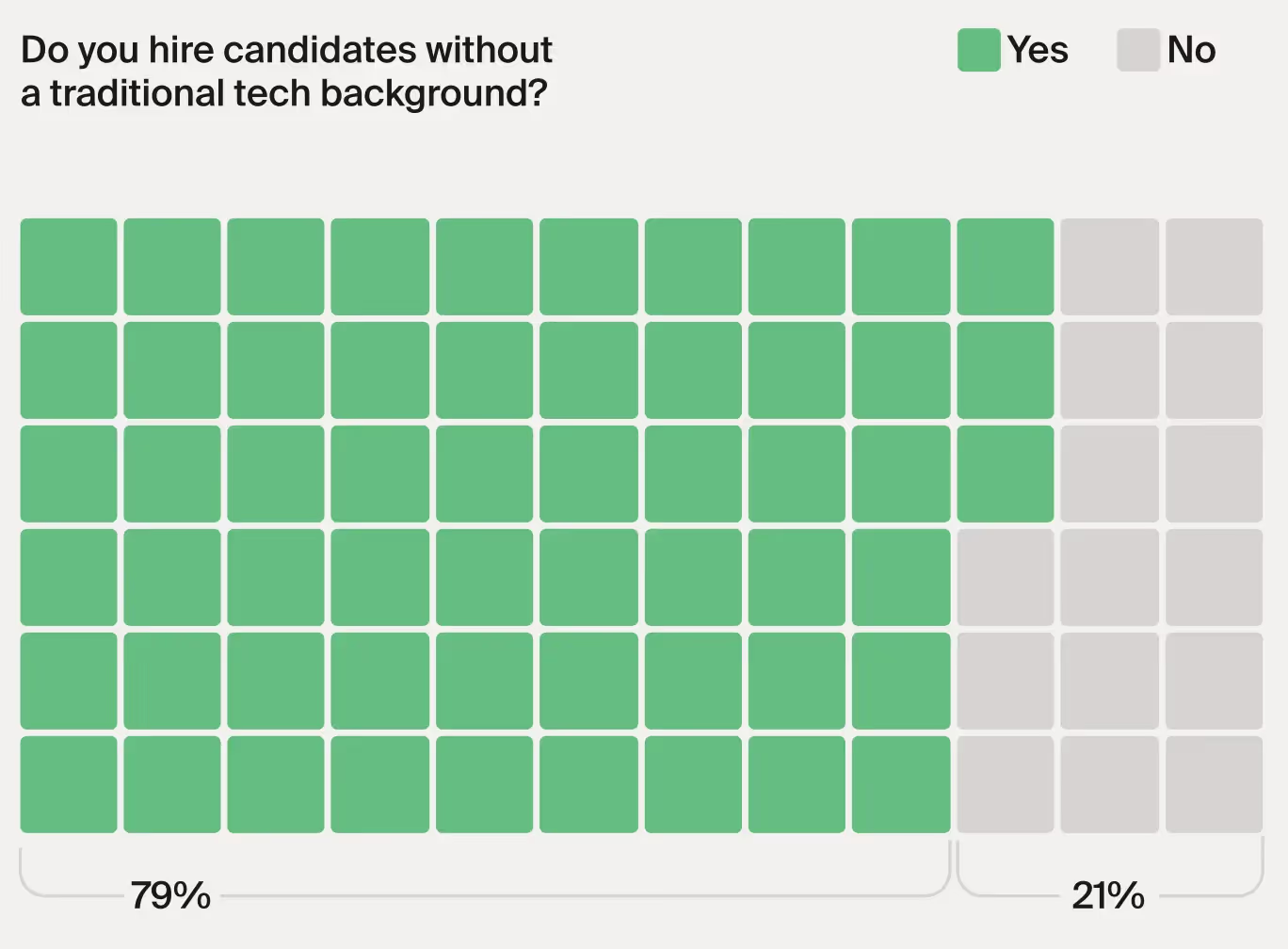Unsurprisingly, we hear the question “Are coding bootcamps worth it?” fairly often. Equally unsurprisingly, our answer is an unequivocal “Yes.” But the question and our answer share a flaw: they’re both too facile.
See, enrolling in a coding bootcamp is a decision that different people make for different reasons. One group of bootcamp students might be looking for job placement opportunities. Others choose to learn to code because they want a skill that will give them a sense of ownership over their future. In both cases, they can say that a coding bootcamp is worth it, but they’re coming at the evaluation from their own perspectives.
To not make a muddle of the answer by trying to satisfy everyone at once, we’re breaking our answer down into two parts. In this first part, we’re going to focus on the numbers. Want facts, employment rates, average salaries, and insights into what employers are looking for? That’s all here.
To tackle the less measurable ways in which a bootcamp is worth it — fulfillment, a sense of purpose, freedom — we’ve got another article here.
Grand. Now let’s dive into some metrics. Here’re the numbers showing why it’s worth it to go for a coding bootcamp.
Will a tech bootcamp pay off?
Often, when people ask about worth, also in the form of “Do coding bootcamps work?” what they want to know is the return on investment. After all, one of the explicit promises is that bootcamp grads will increase their income. And our Outcomes Report shows that, yes, a bootcamp is worth the money. Let’s look at some stats.
For this example, we took data from the Outcomes Report, specifically for our Software Engineering program. The average salary of people who enrolled was $46,000. Then, we assumed that this hypothetical bootcamp graduate chose the most expensive method of paying for their tuition, a ten-month installment plan totaling $12,000.
We put the switcher and the stayer at the same starting place for obvious reasons, but then we looked at what would happen just in the first year after the switcher graduated. Among TripleTen Software Engineering graduates, the median salary was $75,100. But that higher salary needs to be mitigated by the cost of the bootcamp itself, so we took that $12,000 off.
Still, the bootcamp graduate saw their earnings increase by $17,000. And, sure, raises are a thing, so we accounted for a typical 3% raise for the person who stayed put. That led to a salary bump of $1,380, nothing close.
Even at its most expensive, the bootcamp more than pays for itself within the first year of landing a new job in tech. This trend cascades to each of our other programs, too.
Note: there are other ways of paying for the programs that are far cheaper, too. For example, if you cover the Software Engineering Bootcamp upfront, you’ll pay only $9,700.
And there’s one crucial piece of data missing from all these graphs. They only reflect the first jobs that our grads get after graduation. Naturally, as experience rises, compensation does, too.
Let’s return to the previous example: a TripleTen grad who becomes a software engineer. If they were to simply follow the basic path outlined in data from Glassdoor, this is how their earnings would grow over time:
And like we said, that’s assuming that this hypothetical coder follows the Glassdoor-outlined growth path. If they specialize as they pursue a tech career, it’s not impossible for them to find jobs that pay up to $270,000.
So. Are tech bootcamps worth it? If we just talk about return on investment, the answer is an unequivocal yes.
Will I land a job after a coding bootcamp?
But when you wonder about the efficacy of programming bootcamps, the potential gains on the other side of your education are contingent on a fairly basic consideration: will you actually find the job?
For 87% of our grads, the answer is yes.
Bootcamps offer the education that decision makers are looking for. They’ve told us so; in our survey 79% of decision makers said that they already hire candidates without a traditional tech background.

And more than that, 86% of decision makers said they were confident or very confident about hiring bootcamp grads.
.avif)
Let’s get even more granular about this. If we dive into what that means by industry, we can see that among IT/tech companies, having a bootcamp certificate is an absolute point in your favor — it increases decision maker confidence in applicants.
.avif)
In total, 49% of respondents said that they were very confident in hiring bootcamp grads as opposed to the 44% who said they were only confident.
Why? Simple: when you graduate from a bootcamp, you get the practical know-how that makes you a good hire. In our survey, decision makers shared that hard skills and soft skills were the most important qualities for successful candidates. That’s exactly what a coding bootcamp focuses on.
.avif)
This is in part why job placement rates are so high after bootcamps — 87% of TripleTen grads land the jobs they trained for within six months of finishing the bootcamp. And that’s a specific point to keep in mind: we’re not talking about landing any job.
People enroll in a bootcamp with the implicit understanding that they will pivot to a totally new job, and that is the precise thing we set you up for. We’re about helping you land the job.
In fact, we’re so confident in our ability to help you reinvent your career that, after following our employment guidance, you’ll get your money back if you haven’t landed a job within six months of finishing our program.
What are the career prospects in tech?
But finally, let’s talk about the last way we’re so sure that bootcamps are worth it in 2025. Based on our in-house data as well as data from the U.S. Bureau of Labor Statistics, the prospects of a career in tech are so good that you’ll likely only feel compelled to make a career pivot once.
Let’s continue with our software engineering example. The Bureau of Labor Statistics bunches software engineers with software developers, quality assurance analysts, and testers. And, according to the BLS, these professions are projected to grow 25.7% from 2022 to 2032. That’s nearly ten times the average.
Our survey data supports this, but gets more granular. According to our findings, software engineers, data analysts, and web developers will be in high demand in 2025 across all industries.
.avif)
If you want more industry-specific information, check out the Employer Survey.
Here, we’ll emphasize the point — because of the promising prospects you open for yourself by gaining tech skills, you’ll likely never find yourself in the position you’re in now: wondering if you need to totally revamp your career.
Let’s just return to the U.S. BLS data one more time, though.
Of the top five professions with the highest projected job growth, three are in tech. The other two are in healthcare. Nurse practitioners need college degrees in nursing, ideally master’s degrees. The story’s the same for medical and health services managers.
And to switch into tech, as we’ve already discussed, you don’t need a college degree in computer science. All you need are the hard and soft skills that will prove you know what you’re doing.
You can get on this remarkable growth path without spending up to eight years studying. In fact, with a bootcamp, you can master tech know-how in under a year.
You wouldn’t be the first to make the switch, either. But we talk about the human stories behind our confidence in our coding bootcamp in part two.
Is a bootcamp right for you?
In the meantime, see whether a part-time bootcamp would be the right fit for you. Take our self-assessment quiz to find your best path to tech.






.webp)





.avif)

